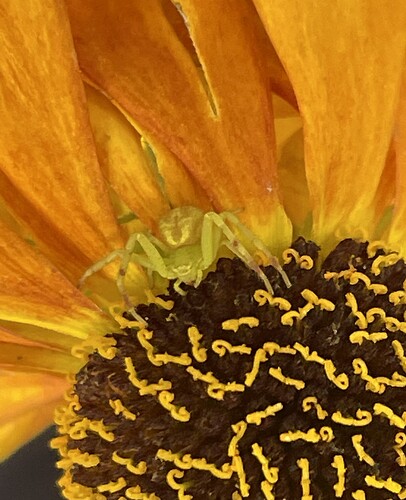Same here. Lead with the clear shot, follow with the best camou. That way more people get to enjoy and understand what you went through.
I am very pleased to see spiders so well represented here… many are indeed amazing when it comes to camouflage.
I love photographing camouflaged animals, so I have lots of those shots. I think the best one in this context has to be this caterpillar
Other great ones I think
I couldn’t see this grasshopper at first, one of the rare times I used the flash:
A snake mantis:
A “please keep an eye while I take the picture” wolf spider:
And a “if it landed on a blade of grass I would have been unable to take a picutre” giant green slantface:
That caterpillar and scorpionfish have very impressive camouflage.
This moth that got it half right:
https://www.inaturalist.org/observations/72010840
And this bird that I would never have seen if it hadn’t moved:
That’s a cropped photo. Without cropping it would have been like the ringed plover further up this thread.
https://www.inaturalist.org/observations/249129646
Winning at Camouflage - Orthoptera Edition:
Can you spot me in the grass,
Can you spot me on the wall?
Can you spot me in the twigs,
Can you spot me as I crawl?
Grass / Acrida cinerea (Oriental Longheaded Locust · 방아깨비):
Wall / Tetrix japonica (모메뚜기):
Twigs / Oedaleus infernalis (팥중이):
Crawl / Acrida cinerea (Oriental Longheaded Locust · 방아깨비):
So many options for this! How about a few spiders:
https://inaturalist.ala.org.au/observations/205814852 (There’s a closeup in the observation, if you can’t find it here.)
https://inaturalist.ala.org.au/observations/206184011
https://inaturalist.ala.org.au/observations/205676484
https://inaturalist.ala.org.au/observations/226377656
https://inaturalist.ala.org.au/observations/220466748
Does it count if they’re in the middle of an obvious web?
https://inaturalist.ala.org.au/observations/227276966
https://inaturalist.ala.org.au/observations/205603046
Awesome! And yes, they do count in the middle of the “obvious” web (sometimes not so obvious until the last seconds…) I think it counts extra if you can get around or past the web without tripping one of those web lines.
details
Two for one. Did you notice the caterpillar? The spider didn’t.
Misumenoides formosipes
White-banded crab spiders are yellow instead of white (including their “white” bands) if they’re on yellow flowers, like this sunflower.
Synchlora
Some Synchlora caterpillars attach bits of flowers to themselves for camouflage.
Hah! It took several minutes and much enlarging but I see it. Good one!
I forgot about fish!
My friend took me to see this one, and when I asked how he found it, he said he ‘stood on something squishy’.
And this is why I’m scared of the sea.
That fact that this could be ID’d is also crazy, fair play to the IDers!
That reminds me of some pretty good camo I have seen in flatfish in our lagoon/spit like this one
https://www.inaturalist.org/observations/96052747
My winning ones are two spiders:
This Eustala sp. who I had to look over the full photos for a long while until I found it (it’s a bit to the right and down of the center, in that big crack)
And this two-tailed spider who I found by almost squishing it by accident (in this photo it’s between my fingers)
and my loosing one is this one, which I think is a moth thanks to iNat suggestion, but honestly looks like a dead leaf so well that I only found it because it was hiding in my bed cover lol
The advanced camouflage with sandy substrate…
https://www.inaturalist.org/observations/246943973
At the edge of the wide sandy flats, was the muddy seagrass meadow, a buried
https://www.inaturalist.org/observations/247648491
https://www.inaturalist.org/observations/246944468
Cryptosoma cristatum (Brullé, 1839)
https://www.inaturalist.org/observations/252027846
Bothus podas (Delaroche, 1809)
But who doesn’t manage to cover themselves with sand to hide?
Here are two spiders I came across recently in my old observations. They’re only conspicuous because these are heavily cropped photos.
This goldenrod crab spider was definitely winning at camouflage, and what it won was a hapless drone fly:
This one was patiently lurking, no prize yet.
Stink Bug, Cuspicona eremophilae














































